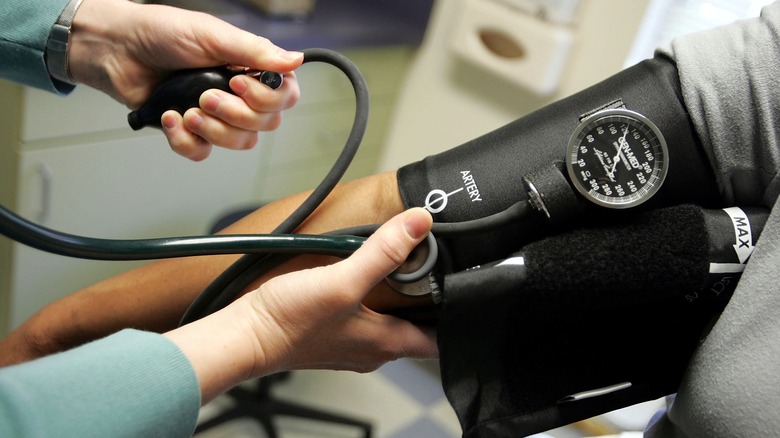The Best Time Of Day To Check Your Blood Pressure, According To Science
Blood pressure is an important vital sign that you're probably used to having checked each time you go to the doctor. Your blood pressure can even be checked at home — and it's important to know the best time of day to check it, too.
There are two blood pressure numbers and it's important to know both of them, according to WebMD. The first or top number is called the systolic blood pressure, which is measuring the pressure on your blood vessels as your heart beats and pumps blood through the arteries. The second or bottom number is called the diastolic blood pressure, which measures the pressure in between heart beats. During this time, the heart gets oxygen and fills with blood again. A normal blood pressure is below 120/80.
If your blood pressure is higher than this, it can eventually lead to health complications, according to the American Heart Association. Prolonged high blood pressure that isn't treated can damage the blood vessels and cause heart attack, stroke, heart failure, kidney disease, vision loss, sexual dysfunction, angina, or peripheral artery disease.
Check your blood pressure to monitor your health
If you have a blood pressure monitor, you can measure your blood pressure at home easily (via Healthline). Alternatively, you could go to a free public kiosk at a pharmacy or grocery store, though these aren't always maintained well for accuracy and cleanliness. Since blood pressure changes throughout the day, it's important to take readings at the same time every day. Blood pressure is affected by events throughout the day, so taking it at a consistent time each day ensures you're getting an accurate reading. A good time is in the morning before eating or drinking, as that can raise your blood pressure.
Healthline recommends avoiding smoking, drinking alcohol, or exercising at least 30 minutes before taking a reading. Best practices include relaxing for five minutes beforehand, making sure you're warm and comfortable, sitting with your feet flat on the floor, resting your arm at heart level, and not talking while taking the measurement. It's even beneficial to take it again three minutes later, to ensure accuracy. You can maintain a healthy blood pressure by following a heart-healthy diet, getting exercise, quitting smoking, reducing stress levels, and getting good sleep.


